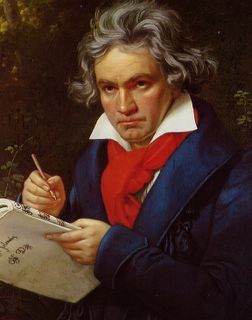
Who else? Beethoven...

For Them and Us
In 1798, Ludwig Van Beethoven began to notice a drastic decline in his ability to hear. Over the next couple of years he struggled to come to terms with the fact that he would soon be deaf. By 1802 he was. He kept notebooks with him at all times so that people could write down their half of the conversation. Can you imagine a composer of music who can’t hear? That’s like Tiger Woods losing an arm and still being among the world’s greatest golf pros. Almost every piece of music written by Beethoven that you could name or sing along to off the top of your head was written after he lost his hearing… Included in this list is Beethoven’s ground-breaking 3rd symphony (Eroica), his enchanting 14th piano sonata (Moonlight) as well as the incredible 5th and 9th symphonies.
In 1806 Beethoven published three string quartets as Opus 59 that he dedicated to the Russian ambassador in Vienna named Count Rasumovsky. Two years later they were premiered in Vienna and audiences were appalled! The critics called it “music by a madman.” The pieces were unlike anything ever written for a string quartet and the listening public rejected them outright. But Beethoven didn’t care. When confronted with the unpopularity of the Opus 59 quartets, the composer responded by saying, “It’s not meant you, but for times to come.” This deaf man was actually so far ahead of his time, that anticipating where the art form would go, he wrote pieces that would appeal to the future listeners and performers of music… And by the way, he was right! Beethoven’s Razumovsky quartets are among the most beloved pieces in the genre and are still performed worldwide.
Tons of things that were written in ages past are still beloved today, but Opus 59 was written with the future in mind… almost as if he was composing them for us. Did you know that the Bible is like that? In Romans 15:4 Paul said that “Everything that was written in the past was written to teach us, so that through endurance and the encouragement of the Scriptures we might have hope.” The Bible is unlike every other book in the world because it contains the actual words of God, the Creator and Sustainer of the Universe! These words written thousands of years ago were written for those who first heard them and they were written for us. God had you in mind when He breathed His words into Scripture.
When you read Shakespeare, Chaucer or Dickens you can learn a lot about the times in which those guys lived and you might even learn some cool things about human beings in general or society in general, but when you turn to the Scriptures, God Himself is speaking to you. He is speaking directly to you, right now, in your situation about the condition of your heart and what He is doing in your life. Isn’t that amazing? That means that when Jesus said God has numbered the hairs of your head, He was talking to Peter, James and John 2,000 years ago in Palestine, but He has also numbered the hairs on my head, right here in Oak Ridge Tennessee in July of 2006! G. Campbell Morgan said, “We come not simply to delve among parchments and musty history, but to the consideration of truths that are fresh as spring; new, as God is new.” When you go to the Scriptures, you are not just reading a book, but meeting with the Living God!

No comments:
Post a Comment